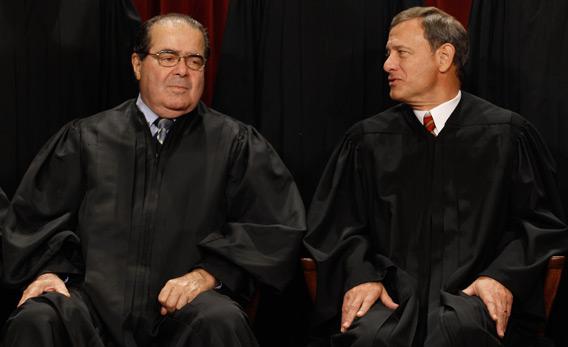Of all the remarkable aspects of this past week’s health care marathon at the Supreme Court, perhaps the most enduring surprise was the degree to which it played out in sound bites, slogans, and bumper stickers, as much as doctrine and case law. Regardless of your views on the merits of the Affordable Care Act, and—oh yeah—its constitutionality, nobody could have failed to notice that the rhetoric inside the courtroom frequently matched the slogans and chants happening on the plaza outside.
For the court watchers who once believed the court would uphold the individual mandate by a wide margin—and I am one of them—the real surprise wasn’t so much that it may very well be struck down, and the rest of the law with it, but that some of the justices appeared willing to talk about the law, Congress, the president, and the Constitution itself, in language few of us had ever heard inside the chamber. Former Reagan Solicitor General Charles Fried expressed surprise that some of the court’s conservatives were not just willing but eager to invoke what he called “the most tendentious of the Tea Party type arguments,” singling out “the whole broccoli argument” as “beneath contempt.” Justice Scalia’s seeming misapprehension that the “Cornhusker kickback” made it into the final bill, along with his suggestion that if the problem with the health care market is that we treat the uninsured, you should, as a society not “obligate yourself to that.” And by Wednesday afternoon, when at least a few justices appeared ready to throw poor Americans off the Medicaid rolls in order to preserve the dignity and autonomy of the states, the line between a Rush Limbaugh segment and oral argument at the highest court in the land had all but evaporated.
I leave it to others to decide whether this shift in tone reflects the fact that the conservatives at the high court have finally dropped their masks and are prepared to embrace the most extreme language of the far right, or if it represents a bit of acting out that will fall away as opinions are drafted, redrafted, and traded. My point here is a smaller one: Why bar television cameras from the court’s proceedings if, in the end, oral argument unfolds in unapologetically made-for-television fashion?
The arguments for keeping cameras out of the high court sound awfully thin after this week, and for the people who stood in line for days, and slept outside in the rain for a glimpse of the proceedings, the idea that what happens inside the court is too sanctified or complicated for mere mortals to understand now seems laughable. Listening to arguments that unspooled in well-trod Tea Party clever-isms, Americans who tuned in for the audio must surely recognize that what the court does isn’t all that different from what the local school board does. They just use bigger words. The notion that it’s just too hard for the average American to comprehend all the nuances of precedent and statutory interpretation rings a little hollow when neither precedent nor statute is invoked except in passing.
And to those justices who contend that they bar cameras from the room because it tempts the participants to act up, to talk in quotable “snippets,” and to showboat for the audience, I would simply suggest that the absence of cameras this week didn’t seem to limit any of it. Indeed if the justices are going to conduct themselves as though they are on a Fox News roundtable, it might be better—not worse—to allow the public to take notice of that fact.
The standard argument against allowing cameras into the Supreme Court is that mere mortals can’t be exposed to all that weighty gravitas and live to tell about it. The question after Wednesday is whether we aren’t entitled to know that all that weighty gravitas is pretty much reserved for the boring cases.
Like most of the folks who spent too much time pinned between the velvet and the marble of the chamber this week, I am not sure I can say much about the fate of the ACA. But if the court’s really poised to become the country’s next great hair-pulling, drink-tossing reality show, it would be better if the nation could watch.
Read all of Slate’s coverage of the Affordable Care Act.
